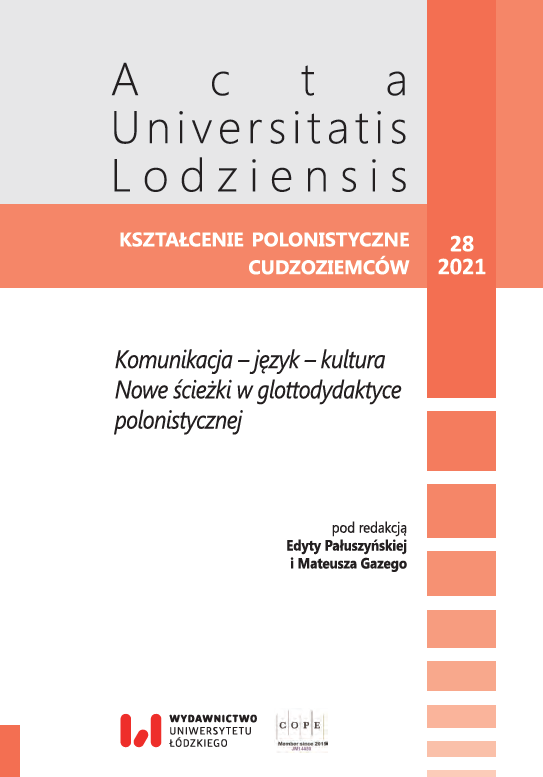For a semantic approach to derivation in foreign language teaching/learning
DOI:
https://doi.org/10.18778/0860-6587.28.15Keywords:
teaching/learning derivatives, mental vocabulary, formal (semasiological) approach, meaning (onomasiological) approach, Polish as a foreign/second languageAbstract
Learning word formation mechanisms (reception level) and acquiring the ability to use derivatives in communication (production level) is a vital issue for foreigners learning Polish, which lets them enlarge immensely their active and passive vocabulary. The derivative system partially belongs to grammar, and partially to lexis, and this fact should be reflected in the language teaching/learning process. In that process, however, it very often ‘belongs exclusively to grammar’. The author, invoking psycholinguistic research, claims that such a solution, though not thoroughly wrong, may result in a lower than achievable level of internalization of derivatives in Polish language learners’ mental vocabulary. An alternative solution, she suggests, is to link teaching of derivatives with particular subject topics.
References
Aitchison J., 1994, Words in the Mind, Cambridge (USA).
Google Scholar
Babik W., 2010, Słowa kluczowe, Kraków.
Google Scholar
Balteiro I., 2011, Awareness of L1 and L2 Word-Formation Mechanisms for the Development of Autonomous L2 Learner, „Porta Linguarum”, nr 15, s. 25–34.
Google Scholar
DOI: https://doi.org/10.30827/Digibug.31981
Bruza P. i in., 2009, Is there something quantum-like about the human mental lexicon? „Journal of Mathematical Psychology”, nr 53, s. 362–377.
Google Scholar
DOI: https://doi.org/10.1016/j.jmp.2009.04.004
Collins B., Nation I.S.P., 2015, Testing Receptive Knowledge of Derivational Affixes, „Journal of Second Language Teaching and Research”, nr 4 (1), s. 6–23.
Google Scholar
Gębka-Wolak M., Walkiewicz A., 2021, Polszczyzna jako fleksyjny język docelowy, w: E. Lipińska, A. Seretny (red.), Dydaktyka języka polskiego jako nierodzimego: konteksty – dylematy – trendy, Kraków.
Google Scholar
Gleason J.B., Ratner N.B. (red.), 2005, Psycholingwistyka, Gdańsk.
Google Scholar
Goldstein R., Vitevitch M.S., 2017, The Influence of Closeness Centrality on Lexical Processing, „Frontiers of Psychology” https://doi.org/10.3389/fpsyg.2017.01683
Google Scholar
DOI: https://doi.org/10.3389/fpsyg.2017.01683
Hacken P., Abel A., Knapp J., 2006, Word formation in electronic learners’ dictionary ELDIT, „International Journal of Lexicography”, nr 16 (3), s. 243–256.
Google Scholar
DOI: https://doi.org/10.1093/ijl/ecl012
Janowska A., 2007, O swoistości derywacji na tle innych sposób nominacji, w: A. Achtelik, J. Tambor (red.), Sztuka czy rzemiosło? Nauczyć Polski i polskiego, Katowice, s. 228–34.
Google Scholar
Janowska A., 2013, Złożoność derywacji czasownikowej z punktu widzenia glottodydaktyki (na materiale czasowników odczasownikowych, w: J. Tambor, A. Achtelik (red.), Sztuka to rzemiosło. Nauczyć Polski i polskiego, Katowice, s. 20–29.
Google Scholar
Janowska I. i in. (red.), 2011, 2016, Programy nauczania języka polskiego jako obcego. Poziomy A1–C2, Kraków.
Google Scholar
Laufer B., 2016, From word parts to full texts: Searching for effective methods of vocabulary learning, „Language Teaching Research”, nr 21(1), s. 5–11.
Google Scholar
DOI: https://doi.org/10.1177/1362168816683118
Laufer B., Hulstijn J., 2001, Some Empirical Evidence for the Involvement Load Hypothesis in Vocabulary Acquisition, „Language Learning”, nr 51 (3), s. 539–558.
Google Scholar
DOI: https://doi.org/10.1111/0023-8333.00164
Milton J., 2009, Measuring Second Language Vocabulary Acquisition, Bristol–Buffalo–Toronto.
Google Scholar
DOI: https://doi.org/10.21832/9781847692092
Nagórko A., 1998, Zarys gramatyki polskiej (ze słowotwórstwem), Warszawa.
Google Scholar
Nagy W.E. i in., 1989, Morphological families in the internal lexicon, „Reading Research Quarterly”, nr 24, s. 262–282.
Google Scholar
DOI: https://doi.org/10.2307/747770
Nassaji H., 2004, The relationship between depth of vocabulary knowledge and L2 learners lexical inferencing strategy use and success, „The Canadian Modern Language Review”, nr 61 (1), s. 107–134.
Google Scholar
DOI: https://doi.org/10.3138/cmlr.61.1.107
Nation P., 2001, Learning Vocabulary in Another Language, Cambridge.
Google Scholar
DOI: https://doi.org/10.1017/CBO9781139524759
Nation P., Webb S., 2011, Researching and Analyzing Vocabulary, Heinle, Cengage Learning.
Google Scholar
Nattinger J., 1988, Some current trends in vocabulary teaching, w: R. Carter, M. McCarthy (red.) Vocabulary and Language Teaching, Longman, London, New York, s. 62–82.
Google Scholar
Neveling Ch., 2010, Mentales Lexikon, w: C. Surkamp (red.), Metzler Lexikon. Fremdsprachendidaktik, Stuttgart, Weimar, s. 217–218.
Google Scholar
Pastuchowa M., 2007a, O słowotwórstwie z perspektywy leksykalnej, w: A. Achtelik, J. Tambor (red.), Sztuka czy rzemiosło? Nauczyć Polski i polskiego, Katowice, s. 21–27.
Google Scholar
Pastuchowa M., 2007b, Dlaczego słowotwórstwo leksykalistyczne? Ogląd faktów diachronicznych, „LingVaria”, nr 2, s. 212–129.
Google Scholar
Pastuchowa M., 2010, Rola słowotwórstwa w kształtowaniu kompetencji językowej cudzoziemców, w: Sztuka i rzemiosło. Nauczyć Polski i polskiego, A. Achtelik, M. Kita, J. Tambor (red.), Katowice, s. 9–15.
Google Scholar
Pastuchowa M., 2013, Słowotwórstwo – sposób na nazywanie świata czy część systemu gramatycznego, w: Sztuka to rzemiosło. Nauczyć Polski i polskiego, J. Tambor, A. Achtelik (red.), Katowice, s. 9–19.
Google Scholar
Rabiega-Wiśniewska J., 2006, Formalny opis derywacji w języku polskim. Rzeczowniki i przymiotniki, niepublikowana rozprawa doktorska, Uniwersytet Warszawski, Warszawa.
Google Scholar
Schmitt N., Schmitt D. 2014, A reassessment of frequency and vocabulary size in L2 vocabulary teaching, „Language Teaching”, nr 47 (4), s. 484–503.
Google Scholar
DOI: https://doi.org/10.1017/S0261444812000018
Schmitt N., Zimmerman C., 2002, Derivative word forms: What do learners know? „TESOL Quarterly”, nr 36(2), s. 145–171.
Google Scholar
DOI: https://doi.org/10.2307/3588328
Seretny A., 2011, Kompetencja leksykalna uczących się języka polskiego jako obcego w świetle badań ilościowych, Kraków.
Google Scholar
Seretny A., 2015, Słownictwo w dydaktyce języka. Świat słów na przykładzie języka polskiego jako obcego, Kraków.
Google Scholar
DOI: https://doi.org/10.12797/9788376386041
Seretny A., 2019, Inferencja leksykalna – ważna strategia czytelnicza w języku obcym, „Kwartalnik Polonicum”, nr 31/32, s. 18–27.
Google Scholar
Singleton D., 1999, Exploring the Second Language Mental Lexicon, Cambridge.
Google Scholar
DOI: https://doi.org/10.1017/CBO9781139524636
Stefańczyk W., Seretny A., 2015, Między słownikiem a gramatyką – słowotwórstwo w perspektywie glottodydaktycznej, „Postscriptum Polonistyczne”, nr 2, s. 45–62.
Google Scholar
Taft M., 1994, Interactive-activation as a framework for understanding morphological processing, „Language and Coginitive Processes”, nr 9(3), s. 271–294.
Google Scholar
DOI: https://doi.org/10.1080/01690969408402120
Downloads
Published
How to Cite
Issue
Section
License

This work is licensed under a Creative Commons Attribution-NonCommercial-NoDerivatives 4.0 International License.










